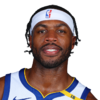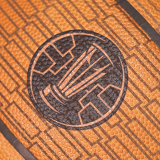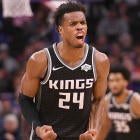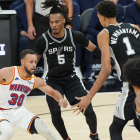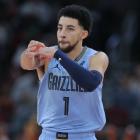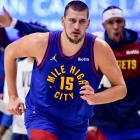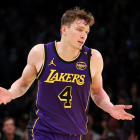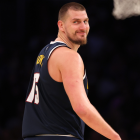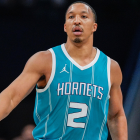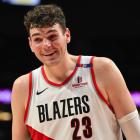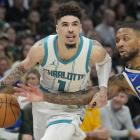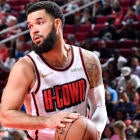MINNEAPOLIS -- It's a shade before noon on a sub-zero February day in Minnesota, and Dave Joerger, the head coach of the Sacramento Kings, is telling his players it's time to leave.
"We're back here in six hours!" the coach shouts.
Buddy Hield pays no heed.
Hield, the third-year shooting guard in the midst of his breakout season, launches up 3s from the corner. He moves to the top of the key, where he makes eight in a row. On the other end of the court, Harrison Barnes finishes his work at the morning shootaround, then a trainer stretches out his legs. Hield and Bogdan Bogdanovic are the only two players left on the court. Hield makes four more 3s from the top of the key, misses one, makes a few more and then moves to the wing. A team trainer announces the first bus has already left to the team hotel. Bogdanovic ends his shooting workout and heads to the locker room. Hield keeps shooting.
"You got five in a row in you?" an assistant coach asks Hield.
"I got 30 in a row!" Hield smiles.
The lights at the Target Center flicker off, and that signals the official moment when Hield has overstayed his welcome. So he strides off the court, the perfect story of a player who has willed himself to become an NBA star.
"Just hungry, man," Hield, 26, said with a smile as he strode to the locker room. "Never had nothing as a kid. My family never had nothing, my mom never had nothing. Just trying to make everything better for them, and show everybody in the Bahamas that you just keep working hard to chase your goals and your dreams and anything is possible."
Almost exactly two years ago, during his rookie year in the NBA, Hield was traded while the 2017 All-Star Game was being played. Well, that's sort of the context-removed edition of his trade story. It wasn't so much Hield being traded as it was Hield being part of a package that sent DeMarcus Cousins to New Orleans. At the time, the trade was widely panned for the Kings. "Pelicans Fleece Kings, Land DeMarcus Cousins in Blockbuster," read one headline. That story gave the Kings an F for the trade, stating, "This is a bad day for the Kings organization." Another story gave the Kings a D: "Hield can reasonably be expected to perform no better than replacement level over the three years remaining on his rookie contract." It was a near-consensus that the Kings got jobbed, with this very website grading the trade an F: "This is a disaster … They lost Boogie Cousins and got very little in return."
Turns out that with Hield as that trade's centerpiece, the Kings are the unambiguous winners of the trade, as the trade set in motion a turnaround that has the Kings as the single-most surprising team in the NBA this season.
At 31-30 after Wednesday night's overnight home loss against Milwaukee, the Kings sit in ninth in the Western Conference playoff race, just two games out of the playoff race. Why be talking nice things about the Kings now, when they've lost four out of five? Well, look at three of those losses: They lost a one-possession game on the road to Denver, the team with the best home record in the NBA. They lost a one-possession game on the road to the Golden State Warriors, who are the Golden State Warriors (and who've beaten the Kings four times this season -- by a combined 12 points). They lost a one-possession home overtime game to the Bucks, who have the NBA's best record. Smooshed in the middle of those close losses was a road win at Oklahoma City.
The Kings, back in action on Friday against the Clippers (10 p.m. ET -- watch on fuboTV with the NBA League Pass extension), are a team that's fun to watch and feel on the cusp of something great, much like the Nuggets from a year ago, who just missed out on the playoffs before blossoming into one of the NBA's top teams this season. If the Kings follow the Nuggets' path, the thing that will have set it in motion will be that much-maligned Hield trade.
That Hield trade netted the Kings not just Hield but also a first-round pick, which Sacramento later flipped into two first-rounders that would become Justin Jackson and Harry Giles. Giles is still a high-ceiling young big man, and Jackson (along with Zach Randolph) was dealt at this year's trade deadline for Harrison Barnes, a player who can only increase the Kings' ceiling. Hield and his backcourt mate, last year's lottery pick De'Aaron Fox, have been the central pieces in Joerger's dramatic rethinking of the Kings' style of basketball this season. A year ago, the Kings were dead-last in pace. This year, the Kings rank first in the NBA in pace, and are scoring 114.0 points per game, which is sixth in the NBA -- compared to a league-low 98.8 per game a year ago. Hield has been a huge beneficiary of this new system.
"It's our identity, but it's also why my voice hurts, because I'm always like, 'GO! COME ON, LET'S GO!'" Joerger said. "For us to play fast, everybody has to buy in. We're going to get up and down the floor, and if two guys don't run, you're not going to be a running team. That guy [Hield] can run all day. And it behooves him to do so with a speed point guard, and now all of the sudden he's finding transition 3s that are like, 'Oh my gosh -- I'm open again? This is great!'"
And it's true: Hield can run all day. Only five players in the NBA run further in an average game than Hield does, according to NBA.com, and each of those players average two or more minutes per game than Hield does -- meaning that on a per-minute basis, Hield bests them all. And when Hield is dashing around the court, either trying to get open for a bucket or chasing down his man on defense, he's always going all-out: Hield's average speed while he's on the court is 4.72 miles per hour per NBA.com, tops among NBA rotation players.
Look at Hield's numbers so far this season: He's averaging a career-high 20.8 points per game on career-best 44.4 percent 3-point shooting, on a career-high 7.6 3-point attempts per game. Pretty damn good, right? As a point of comparison, check out Western Conference All-Star Klay Thompson's numbers this season: 22.1 points per game, and 40.0 percent 3-point shooting on 7.6 3-point attempts per game. Let these words sink in: On the offensive end at least, Buddy Hield is having virtually the same season as Klay Thompson -- perhaps a smidge better. If you want to say that, well, Hield's defense is so much worse than Thompson that that is a silly comparison, well, sure -- but then you should also note that Hield's defensive metrics outstrip Thompson's this season. Hield beats Thompson in defensive rating and defensive box plus/minus.
"[It's] his ability to get open," Timberwolves head coach Ryan Saunders said about Hield's leap this season. "People remember how Rip Hamilton used to move, or even guys like Ray Allen, how they moved without the ball. Buddy's in constant motion. They do a good job of setting screens to get him open. But in terms of him stopping and going, changing speeds, changing directions, he's in constant movement. He's a smart player in the sense that if he sees you're relaxed or on the weak side, he's going to cut to an open area and try to get a shot off."
If Hield's success in the NBA is unlikely considering how people thought of him when he was traded to the Kings two years ago, his story of making the NBA in the first place is 100 times less likely. He grew up extremely poor near Freeport, Bahamas. He grew up in a home with his mother, grandmother and six siblings. His first basketball hoop was a plastic milk crate that Hield sawed the bottom out of and nailed to a light pole in the street. Forget making the NBA: Simply making it to play Division I college basketball was something of a miracle for Hield. He was the 113th-ranked recruit in his recruiting class when he committed to Oklahoma.
The young man's basketball is infused with joy, and his crooked path to stardom has made him filled with a level of perspective. And so when he found out one night during his rookie year that he had been traded, Hield was crushed, of course. "You feel like you're not wanted -- you feel like the franchise gave up on you already, like you wasn't good enough for them," Hield said. But he landed in a place where he was wanted -- where the Kings owner, Vivek Ranadive, thought Hield had similar potential to another skinny kid who was once overlooked before becoming one of the best shooters in the NBA: Steph Curry.
"You feel more comfortable, more relaxed when somebody wants you," Hield said. "I always had it. I just needed more opportunity -- and I needed time. I always told people, 'Game time, I'm going to show you what I can do with it.' So I'm getting the opportunity, and I'm proving my point."
In the offseason, Joerger called each player. "Make sure you get your conditioning in!" he told them during those summertime calls. "Make sure you prepare yourself to play fast!" "We were playing pick-up," Hield said, "and he's like, 'Play fast! Play fast!' He'd see us playing and he'd say, 'Y'all going too slow -- you gotta go faster than that.'" For Hield, it's been freeing. As long as he's willing to run and get open -- find the cracks in a defense -- then this system works perfectly for him.
"If you want to be successful you gotta do the things that other people don't do," Hield said. "You gotta run harder than everybody."
And if there's anything Buddy Hield can do better than anyone else can, well, there it is right there.



